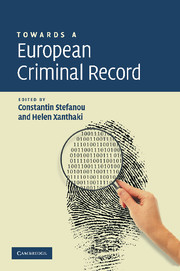Book contents
- Frontmatter
- Contents
- List of contributors
- Preface and acknowledgements
- 1 Introduction: How did the idea of a European Criminal Record come about?
- PART I
- PART II
- 5 The European Criminal Record in Austria
- 6 The European Criminal Record in the Czech Republic
- 7 The European Criminal Record in Germany
- 8 The European Criminal Record in Greece
- 9 The European Criminal Record in Hungary
- 10 The European Criminal Record in Ireland
- 11 The European Criminal Record in the Netherlands
- 12 The European Criminal Record in Slovenia
- 13 The European Criminal Record in Slovakia
- 14 The European Criminal Record in Spain
- 15 The European Criminal Record in England and Wales
- PART III
- 19 Conclusions
- Index
9 - The European Criminal Record in Hungary
Published online by Cambridge University Press: 13 July 2009
- Frontmatter
- Contents
- List of contributors
- Preface and acknowledgements
- 1 Introduction: How did the idea of a European Criminal Record come about?
- PART I
- PART II
- 5 The European Criminal Record in Austria
- 6 The European Criminal Record in the Czech Republic
- 7 The European Criminal Record in Germany
- 8 The European Criminal Record in Greece
- 9 The European Criminal Record in Hungary
- 10 The European Criminal Record in Ireland
- 11 The European Criminal Record in the Netherlands
- 12 The European Criminal Record in Slovenia
- 13 The European Criminal Record in Slovakia
- 14 The European Criminal Record in Spain
- 15 The European Criminal Record in England and Wales
- PART III
- 19 Conclusions
- Index
Summary
Introduction
The legal framework of maintaining criminal records and access to the entries contained in these records, including cooperation with foreign authorities, has been recently modified by the Hungarian legislature. The prevailing legislation treats separately the types and contents of the criminal records on the one hand (first unit), and the use of them for the purpose of international cooperation in criminal matters on the other hand (second unit).
Accordingly, the first unit of the current regulatory framework is laid down in Act No. 85 of 1999 on the Criminal Record (Criminal Record Act or CRA). The CRA sets out the rules on criminal registers, including the types of register, the content and the accessibility of entries, the duty to provide data, as well as the surveillance body and data protection principles. The CRA is supplemented by a number of ministerial decrees, which regulate the technical aspects of the registers. For example Decree No. 6 of 2000 of the Minister of the Interior on the issue of extracts, Joint Decree No. 7 of 2000 of the Minister of the Interior and the Minister of Justice on the body in charge of keeping and maintaining criminal registers and the rules governing access to data contained therein and, lastly, Decree No. 8 of 2000 of the Minister of the Interior on photographs and DNA profiles.
- Type
- Chapter
- Information
- Towards a European Criminal Record , pp. 181 - 196Publisher: Cambridge University PressPrint publication year: 2008



